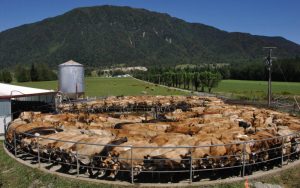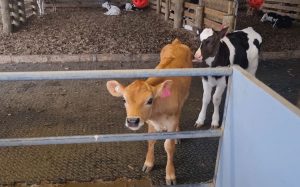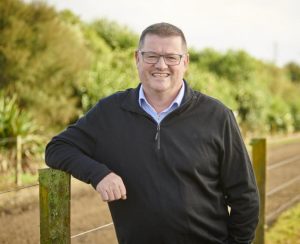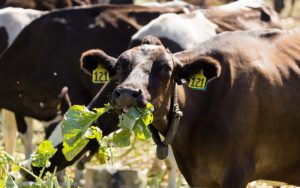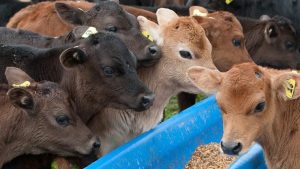
Canterbury’s Richie Bocock knows as much as the next person that a life dedicated to dairy farming can throw a few challenges.
“When I left dairying six years ago, I felt that things might have been getting on top of me a wee bit,” he says. “Our decision to leave dairying and pursue a different path – while still living on the land – was a positive move; we have created something good for our family.”
Richie, with wife Kate, owns Te Wepu Farm on Banks Peninsula, near Christchurch. They bought the 32ha property in 2016 and have since built a multi-faceted business that not only supports their love for the land but recognises the need for a lifestyle that is sustainable.
The couple run beef animals, cultivate a sizeable avocado orchard and have built unique accommodation “pods” that allow guests to take in views of nearby Akaroa Harbour and reset from the pressures of everyday life.
When the couple decided to leave dairying after 10 years in an equity partnership, they were unsure of their next step. However, after they “stumbled across” Te Wepu, plans for a different kind of business on the land took shape.
Te Wepu was founded in 1843 in the historic French Farm Valley on the western side of Akaroa Harbour.
Richie and Kate bought the farm in 2016 and moved onto the property in 2017. In the first 12 months the property underwent a big transformation, starting with the renovation of the house.

They established a small mob of beef animals and prepared an area to plant an avocado orchard.
Having ordered the avocado trees in 2016, in October 2018 they planted 80 trees, which are now six years old and have their first crop coming on. They have expanded the orchard a little to 90 trees.
“Planting the avocados has been very exciting,” Richie says.
“No one else in the region is doing it – we believe we are the southernmost avocado orchard in the world. Hopefully, the avocados will provide a reasonable chunk of income going forward.
“I was taught that the only way to get anywhere was to take a risk.”
That was certainly the case when they came up with the idea of building the pods to supplement their income.
“That is 90% of what we do now – host guests in the pods, nine months of the year,” Richie says.
The three sleeping pod sites are dotted around the top of the property, which is covered in bush with beautiful views of Akaroa Harbour, Onawe Peninsula and French Farm Valley.
Each site has two pods: a dedicated sleeping pod that sleeps two, and a utility pod, which includes a composting toilet and changing area.
The pods were built off site and helicoptered in in 2017.
Each private setting has a wood-fired hot tub, fire pit, gas BBQ and spring water, and is positioned out of sight and sound of the others.
Guests are given the choice to 4WD themselves to their pod or hike the beautiful 20-minute walk with bags (and/or guests) transported by the Bococks on their 4×4 Kubota, known as Donald.

“We didn’t want to do glamping under canvas because others were doing that and we wanted to do something different,” Richie says.
“We included the hot tubs straightaway and try to do things a bit different by including our home-grown beef in the hampers that Kate makes for guests.”
The hampers are loaded with fresh, seasonal and local produce: steak and sausages from the grass-fed beef herd at Te Wepu, Kate’s famous cob loaf, fresh fruit, vegetable kebabs and wine, among other delicious treats.
“Kate has real strengths with the marketing and business side of things; I’m more of the firewood guy,” Richie laughs.
He says one of the most rewarding things about having the pods is seeing the difference a couple of days of rest and relaxation can make.
“You see people turn up and they look absolutely knackered, and they are totally different people on the way out,” he says.
“They can take in the views and the environment, get off the computer, sit around an open fire and reconnect.”
He says about 70% of the people who stay are Kiwis, and many of those are local Canterbrians.
Richie and Kate have given nights’ accommodation to staff at the Intensive Care Unit at Christchurch Hospital, St John Ambulance, and local farmers affected by M bovis, through the Rural Support Trust.
“We would have hated to be in that situation, and at that time dairy farmers were also getting a bad rap across the board; they were getting pummelled,” Richie says.
“We wanted to give something back to the industry that gave us so much.
“When you’re dairying, getting off the farm can be hard. We actually invested in a holiday property to make us get off the farm when we were dairying.”

Despite their decision to leave dairying, which has had an excellent outcome for their family, Richie says dairying is still a fantastic industry.
“We’ve been away from dairying for six years and things have changed a lot in that time, but it is still rewarding and you can still achieve goals if you come from a limited background, alongside the right people,” he says.
“It is important to recognise when things are getting on top of you. In dairying, you can be caught up in a bubble of peer and industry comparison. There is a lot of support out there, rather than battling your way through it on your own. I used to be a ‘head down-bum up’ kind of guy in tough times but it’s not good for relationships.”
Richie was born and bred in Te Awamutu; his father was a builder but he and his five siblings grew up in a rural community. They were encouraged to milk cows on neighbouring farms for pocket money, which prompted Richie’s love for the industry.
“Our parents really instilled in us the value of hard work,” he says.
“From a young age I had an interest in farming, but I knew I had to get an education first.”
Richie spent one year working on farm for Jim van der Poel before he attended Massey University, completing a bachelor of agriculture.
“I knew I didn’t want to milk cows but I did want to work in the industry, so I started as a stock agent for PGG Wrightson; I stayed there for five years, working in Feilding and then Wairoa, Hawke’s Bay,” he says.
“I got to know the sheep and beef industry well, and was able to build on my people skills, which held me in very good stead.”
Richie met his first wife during this time, and found he had an urge to get back onto the land.
“With my dairying background from childhood and the contacts I made at university I was able to get a job contract milking straightaway, in the Waikato, where I stayed for four years,” he says.
“That was the greatest benefit of the education I received – the people I met and contacts I made.”
After a further two-year stint in Australia, where they contract milked for two years, they returned to New Zealand and looked for a new farming position.
“We knew we didn’t want to farm in the Waikato, and it was the year 2000, when the moratoriums came off farm conversions in Canterbury,” he says.
“I got a job as a conversion manager for Dairy Holdings at Oxford, while simultaneously contract milking, and then 50:50 sharemilking.”
Richie spent seven years on that farm, during which time he and his wife separated.
“I started again with a new partner, Kate, and a new job,” he says.
“Kate and I felt we needed to seek a new opportunity, so we entered an equity partnership with the Wilkinson family in Ashburton.”

With a background working for the major fertiliser companies, Kate understood the industry and she and Richie worked well as a team.
“Having the right partner alongside you is incredibly important,” he says.
Richie says surrounding yourself with positive people also matters.
“As a 17-year-old Jim van der Poel was a strong mentor of mine,” he says. “He always said, ‘Richie, you’ve got to make things happen.’ That always resonated with me. You have to look at opportunities, work hard and take them.”
Richie also acknowledges his brother Shane.
“He really taught me a lot about dairying when I was a teenager,” he says. “He went on to win the 1997 BNZ National Sharemilker of the year which, at that time, was a huge inspiration for me to be able to succeed in the industry as well.”
Richie “has his hands full” with five daughters – three older girls in their 20s from his first marriage, and two girls aged 12 and 13 with Kate. He is also a grandfather.
Richie says his cup has always been half-full.
“When you’re 53, like I am, you’ve been through a lot of ups and downs and some people just don’t have the privilege,” he says.
“I always wake up believing that today is going to be a good day, and that we need to make the most of what we’ve got.
“We could have done things differently; we could have focused more on growing the dairy business.
“But I would like to think that there is always someone worse off than myself, so I should be grateful for all of the positive things that we have achieved as a family, and what the dairy industry gave me for those years that we were a part of it.”





